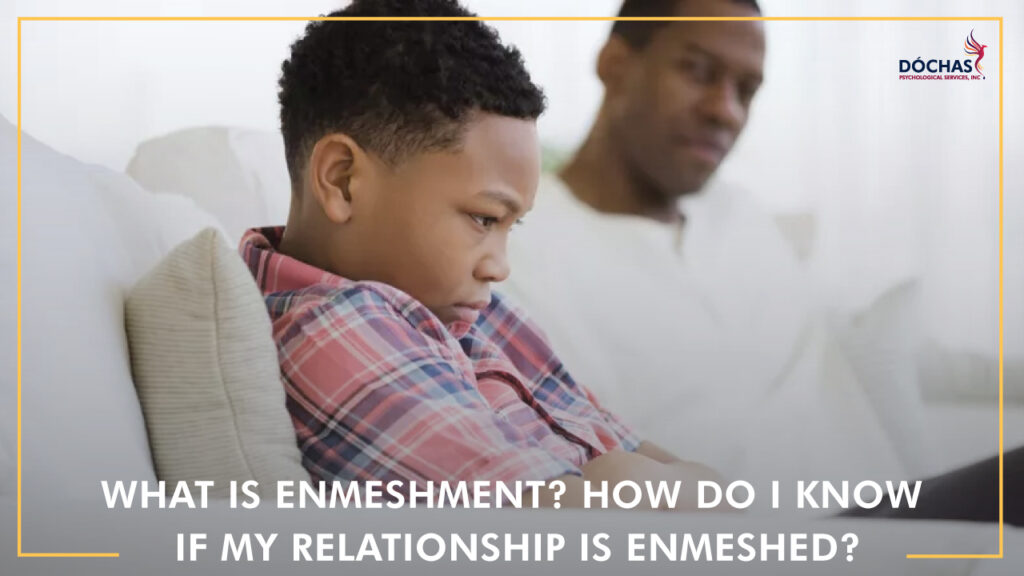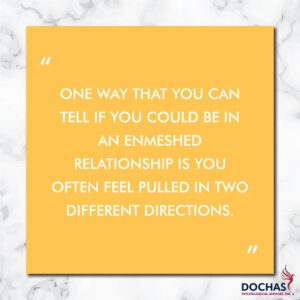Hello and welcome back to the Dóchas blog! Today it’s Kim and Paula, and we’re having a conversation about what enmeshment is, and some characteristics of relationships that are enmeshed. You can watch us talk this through in the video below, or read on to learn more!
Enmeshment is a challenging topic, and we have been trying to figure out the best way to convey it. First, we’ll give an example of what enmeshment could look like, and then we’ll talk about how to recognize when you are potentially in an enmeshed conversation or relationship. We found a great list of examples!
What Enmeshment Could Look Like
An example of what enmeshment could look like is if a mother says something like this to her daughter:
“Oh, you won’t believe the argument your dad and I had last night—it was horrible! He was saying all sorts of mean things to me. He was even bringing up before we were even married and how we were fighting about our sex life—and, like, there was this affair that… Did you know about the affair? Well, you should know about this because it’s been really hard for me to get over that. And I think you know you should really know what’s going on in the family….”
What does a conversation like this feel like for the daughter? As the daughter listens to her mom speak, she probably wants very much to side with her mom. She might think, “Oh yeah, how could he do that?” But there’s also part of her that feels very uncomfortable when her mom starts talking about her sex life and pre-marital engagements—that just doesn’t feel right. So as a child, that is something that will stand out, that something just doesn’t feel right.
The conversation of what the mom and dad have going on is not the concern of the child. This would be an example of crossing a boundary. Adult issues need to stay adult issues. Especially if there is a really important relationship between the child and the other parent, you don’t want to be damaging that.
We used the example of mom and daughter because that is something that we do sometimes see in practice, but it can happen in any dynamic. It could be daughter and dad, or son and mom, or son and dad, or all sorts of things. That’s where we get into family therapy. But enmeshment can occur in any kind of relationship, including romantic relationships.
Emotions in an Enmeshed Relationship
Another thing the child might be feeling in this kind of conversation is the feeling of really wanting to help the parent, almost wanting to save them. Feeling like they should carry some of that emotional brunt. But that’s not the child’s place.
One way to tell if you are in an enmeshed relationship is that, on the one hand, you feel called to help (feeling like, I want to help this person and I care deeply about this person), and then, on the other hand, you might feel kind of icky. You feel torn, you feel like you’re being pulled in two different directions.
You might find yourself reacting by kind of shutting down, letting the person keep talking even though inside you’re starting to feel nauseous. Or you might feel like you want to push someone away. Or you might feel like you want to clap your hands over your ears. So one big sign is that push-pull inside of yourself.
Characteristics of Enmeshment
Here are some more characteristics of enmeshment, which will help you recognize a potentially enmeshed relationship:
- lack of boundaries
- children are not encouraged to individuate or become emotionally independent
- intrusive or need equality
- oversharing
- an unhealthy emotional attachment to a loved one that seems out of your control
- shared emotions—it feels like you have a hard time telling what is your emotion and what is your partner’s emotion
- expected to conform to family norms and traditions, and self-expression is stifled
- parents may treat children as friends or confidants
- a really hard time having engaged relationships with others outside of your immediate family
- an unclear identity or sense of self outside of the family setting or outside of the partner relationship
- a lack of alone time and space while at home, or while spending time with family you don’t have that alone time
- relational boundaries with family members feel unstable
- the desire to be rescued from difficult emotions or the expectation that you will rescue your loved one from their challenging emotions
- demands to know all about your life
Many of these characteristics are from this great resource, “14 Signs of Enmeshment and How to Overcome Difficult Relationship Dynamics,” which also has some strategies for setting boundaries in your family, and assisting you with enmeshed relationships. However, dealing with enmeshment can be challenging and sometimes you need a little more professional helps. So if you’re looking for help with an enmeshed relationship or a difficult relationship, we would love to help you out. If you have any questions at all just reach out to us at info@dochaspsych.com or by calling 780 446 0300.
Resource:
14 Signs of Enmeshment and How to Overcome Difficult Relationship Dynamics
About Dóchas Psychological
Dóchas Psychological Services is a well-established and trusted therapy clinic located in Spruce Grove, Alberta. At Dóchas we value the idea that everyone deserves a safe space. Through connection and education, our team works hard to build a trustworthy relationship with each of our clients. It is our goal to create a community for our clients to feel like they belong.
Disclaimer
Information provided through Dóchas Psychological Services blogs or vlogs is meant for educational purposes only. They are NOT medical or mental health advice. You can read more about our disclaimer here.



